What Is Flash Fiction?
There are, of course, as many definitions of Flash Fiction as there are writers.
Continue reading “Writing Flash Fiction Gems – Small, Precious, and Slower Than You’d Think”
There are, of course, as many definitions of Flash Fiction as there are writers.
Continue reading “Writing Flash Fiction Gems – Small, Precious, and Slower Than You’d Think”
This time next year, you could be staring at a list of achievements that are directly related to the goals that matter to you…
Listen to the podcast episode that goes along with this post:
I love the idea of a fresh start, don’t you?
It doesn’t matter when it happens (New Year, the first day of spring, the start of a new academic year), I’m always ready with my list of “this time it’ll be different” resolutions.
You know what I’m going to say, don’t you?
I’m excited to follow through on my plans for about three days.
Then I start to force myself to stick to the new regime.
Then I start to miss a day here or there…
…and suddenly it’s June and I’m flipping through my journal and I find that massive, guilt-inducing list of Things I’m Going To Do Differently This Year, and my shoulders slump, and I spend the next three weeks in a slump, wondering why I can’t get anything done.
Sound familiar?
I’ve made a case for logging your word count to keep yourself accountable, to give yourself a pat on the back, to encourage consistency and good writing habits.
But it doesn’t have to be word count.
Setting a word count goal makes sense if you’re working on a novel and want it finished by X date.
It also makes sense if you want to become a faster writer.
It might not make sense to set a word count goal if you’re still struggling to create a writing habit. Or if you’re writing flash fiction.
And what if you’re int he editing (or marketing) phase of a project, but still want to feel productive?
In these cases, you might want to to track the number of days on which you worked, to see how your writing practice is becoming part of your life.
Set a goal for the number of days a week that you will Write Something (or Work on Project X).
If you like to keep your logs in a more tangible form:
At the end of the month, step back and gaze at the ‘heat map’ of your work progress. Hopefully there’ll be enough ’stickered’ days to make you smile. If not, make a commitment now to do better next month.
If you can make an unbroken chain of those days that’s great. But bewarE! Setting so high a bar can backfire. What happens the first time life gets in the way and you miss a day? You feel terrible. You get demotivated. You quit.
Rather, I’d suggest setting a goal to write on a certain number of days a week.
At the end of the month, look back at your log see how much you achieved and if any patterns emerge (are weekends good or bad for you? Do you write more when you’ve had more sleep? When the kids are in school?). You can see where you might make changes or improvements.
Again, try to not use the log as a weapon to bludgeon yourself with guilt. Use it to analyze and study (and to face) what’s really going on. Try to increase your goal a little from what you actually achieved this month (not some abstract and possible unrealistic ‘ideal’).
Whatever type of log you choose, use it to keep yourself accountable, spur positive changes, and reinforce good work habits.
Because all of these things get you closer to where you want to be: writing.
Are you logging your writing days or word count? What methods do you use, and how do you use it to help you progress? Share in the comments, below!
You’re trying to write a story a day. Some days will be harder than other.
For those days, here is some tried-and-tested advice from the StoryADay archives.
[tl;dr version: The world needs your story. You need to write. Don’t quit.]

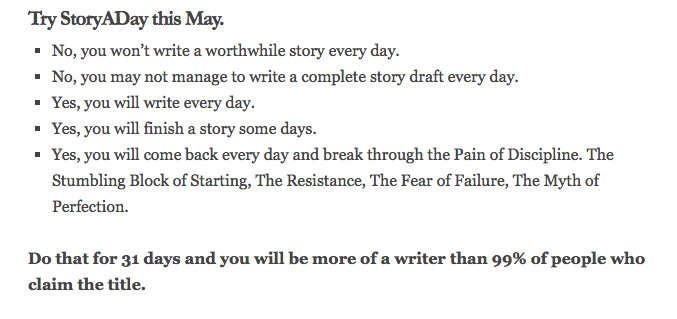
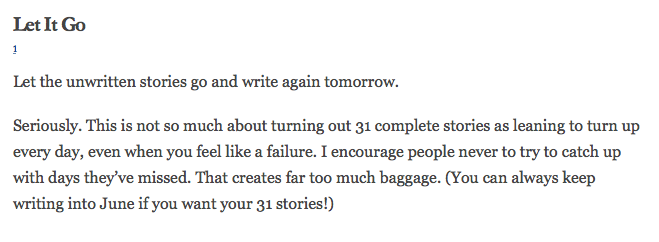
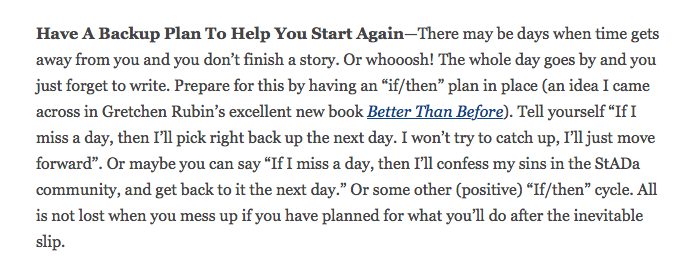
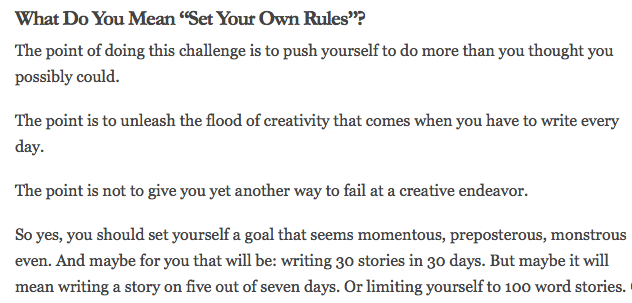

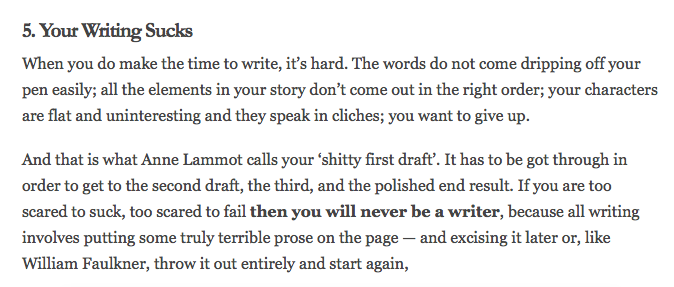
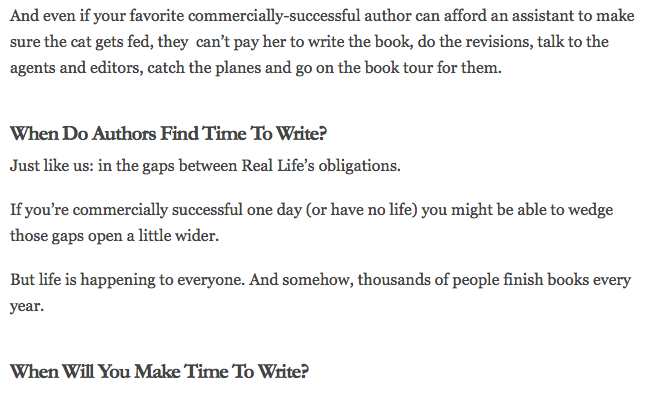
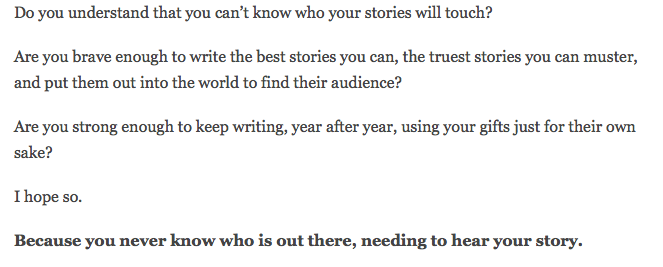
Now, go and write something!
Conference season is upon us! Here are 3 essential tips for surviving a writers’ conference, as an introvert.
Writers’ conferences are wonderful places for learning, connecting, being inspired and reminding yourself to take your writing seriously.
They also have cringe-making moments of high-school flashbacks, with you cowering in a corner, wishing the earth would swallow you.
After the event you’ll remember and value the connections you made and the people you met. In the moment, for introverted writer-types, all that enforced socializing can be torture.
But if top spies can withstand torture with a little training, why not us?
When I think about my favorite people in the world it strikes me that they are not just my favorite people. They are a-lot-of-other-people’s favorite person too. They attract people to them. How? By being interested in us.
Take a leaf out of the book of the most charismatic person you know: make eye contact, ask questions about the other person, have a response ready (or a follow-up question — and yes, you can rehearse these things at home. That’s what successful sales people and successful charmers do!), smile and do whatever you can to make the other person feel great about themselves.
Here are five ways to make the people around you feel great, courtesy of Dale Partridge (click for a bigger view)

(Use this with care. You don’t want to be a parasite.)
If you can connect with someone whose skills complement your own (i.e. an extravert), do so. Ride their coattails. Let them introduce you to people as you go around the conference.
The best way to do this without becoming an actual pest, is to hang with this person a little bit, then give them some space, and connect with them again later. (Maybe you can find two or three extraverts and float between them).
Think about what you can do for them, to repay them for being your ice-breaker: once you’re in a new group of people, tell other people about your friend’s writing, or talents or ask them to tell that funny story you heard them tell earlier to a different group. You can also ask them about their work or their challenges, and keep an eye out for information and opportunities that will help — especially if you’re attending different sessions. Pass on information, contacts and resources you think might help your friend.
How to find your bubbly friend: see if any of your internet friends are going to the same conference. Arrange to meet up, at least once. If none of your friends are going, check out the conference’s hashtag on Twitter (smart conference directors will always have one). Follow the bubbliest Tweeter and, if you make a connection online, suggest meeting up at the conference too. (Naturally, the same rules apply here as in real life: only approach if you sense a real connection. Don’t be creepy. Don’t smother people.)
Don’t berate yourself for needing to crawl off to a dark, quiet space from time to time during the conference.
We introverts need quiet time to recharge. If you need to get out of the hotel for lunch alone, or if you need an afternoon power nap, go for it. Just get back out there when you’re refreshed.
Also, don’t think that just because you’re a bit of an introvert, you can’t be sociable. Some of the most charming people I know are introverts. But they do need to take time to recharge or they become cranky and unhappy. Be yourself. Pay attention to your body. If you’re getting fidgeting and cross, take a break. Alone. It’s OK.
If you’ve made a connection with someone, keep in touch after the conference.
The good news is, you’ll probably be able to do it online, which will be a relief, won’t it?
Writing a story a day is hard. No doubt about it.
In fact, I had long been scared to commit to writing a novel, but after completing my first StoryADay back in 2010, I said, “Surely writing the same story every day for a month has to be easier than that!” and plunged into NaNoWriMo later that year and ‘won’. (I recently completed that novel – my first!)
Writing 31 short stories in a month drives you to the brink of desperation…and it’s right at that brink where interesting things start happening.
Past participant Sarah Cain had just finished a novel and was deep in the business of revising the manuscript and looking for an agent, when she found herself in a creative slump. She heard about StoryADay and was intrigued.
“[I thought] would be a change,” she says. “Give me a chance to get some creative energy flowing, which it did. I had great fun with it, and now write quite a lot of flash fiction.”
In addition, she went back to her novel revisions, refreshed and reinvigorated. The following year she landed an agent and signed a two-book deal for that novel and its sequel.
There are lots of ways to keep writing. Here are some that other StoryADay writers have used:
Accept that these are first drafts — Don’t revise as you write. Just keep moving the story forward, every day until you get to the end. No revisions, no backtracking. Finish with a flourish, drop your pen and walk away. You have the rest of the year to revise these things!
Finish each story — Do your heroic best to get to the end of each story. Even if you have to write something like “[get Frank from the school to the roof of the hospital. Car chase! Explosions]” and skip to the resolution, get to the end of the story.
Resolve as many loose ends as you can and put it on the ‘to be revised’ pile for June. There is an energy about finishing a story that buoys you up for the next one. “You can do this,” it whispers in your ear as you sit down to write the next day. “You told a complete tale yesterday. No reason you can’t do it again today.”
Allow yourself to experiment—Write short-short stories, longer stories, stories that are all dialogue, stories that rhyme, retelling of old stories, retellings of your own stories (in a different point of view, or setting…the possibilities are endless).
Some days you’ll need to do what feels like ‘cheating’ by rewriting a fairytale or reimagining a story of your own, just so you don’t have to work out all the detail. That’s OK. It worked out fine for Gregory Macguire and for Walt Disney…
Allow yourself to fail — You will have some days when it is torture and you when you get to the end of a story and think “what was that?!”. Learn to laugh it off. If you can, figure out why it didn’t work. (Did you forget to give the character something to root for? Did you not know enough about the exotic setting you tried to use? Did you start writing when you were too tired?)
Write down the lessons learned and save them for future reference.
Have A Backup Plan To Help You Start Again—There may be days when time gets away from you and you don’t finish a story. Or whooosh! The whole day goes by and you just forget to write. Prepare for this by having an “if/then” plan in place (an idea I came across in Gretchen Rubin’s excellent new book Better Than Before). Tell yourself “If I miss a day, then I’ll pick right back up the next day. I won’t try to catch up, I’ll just move forward”. Or maybe you can say “If I miss a day, then I’ll confess my sins in the StADa community, and get back to it the next day.” Or some other (positive) “If/then” cycle. All is not lost when you mess up if you have planned for what you’ll do after the inevitable slip.
Join the community — Yes, yes, I know. There’s a danger here. You could spend so much time reading other people’s posts that you never get around to posting, yourself. BUT, there is nothing like a little pat on the back, or a little peer pressure, to make us better than we think we can be. At least post in the Victory Dance group every day after you write something. Congratulate a few other people who have posted, and post a micro-update about your own day. Use the other boards to ask for help, or find a shoulder to cry on when the day didn’t work out as you had hoped.
Don’t ‘quit’ — If you get to day 14 and your life implodes, don’t quit. Change the rules. Admit that life got in the way and you can’t write a story a day this month, BUT commit to writing at least two more stories this month, or one, or whatever you feel you can manage. Come back to the challenge at least one more time.
You’re not failing. You’re learning. Write down what you’ve learned about your writing habits, needs, preferences, struggles, successes, so far this month. Post them somewhere you can find again (a blog is a great place, since it’s archived). Then commit to writing at least one more story before the challenge ends.
Make a note in your diary to check in to the community before the end of May and celebrate the progress everyone has made. Print out your winner’s tiara and wear it with pride, because you showed up. You wrote. You win.
Tomorrow we’re going to talk about story sparks, writing prompts and what you can do NOW to make sure you have the best chance possible of writing 31 stories during StoryADay May. I’ll also be reminding you that I’ll be releasing I have published the StoryADay Guide: A Month of Writing Prompts 2015 on Monday, April 20. Until May 1, 2015 it’ll be selling at a steep discount, so don’t miss that!
Hint: it’s going to look a lot like last year’s edition, but with all-new prompts, tips and pep-talks.
If you want to make sure you receive the rest of this series and notifications about the discounted ebook, and the opening of the StoryADay Community for 2015, join the Advance Notice List: